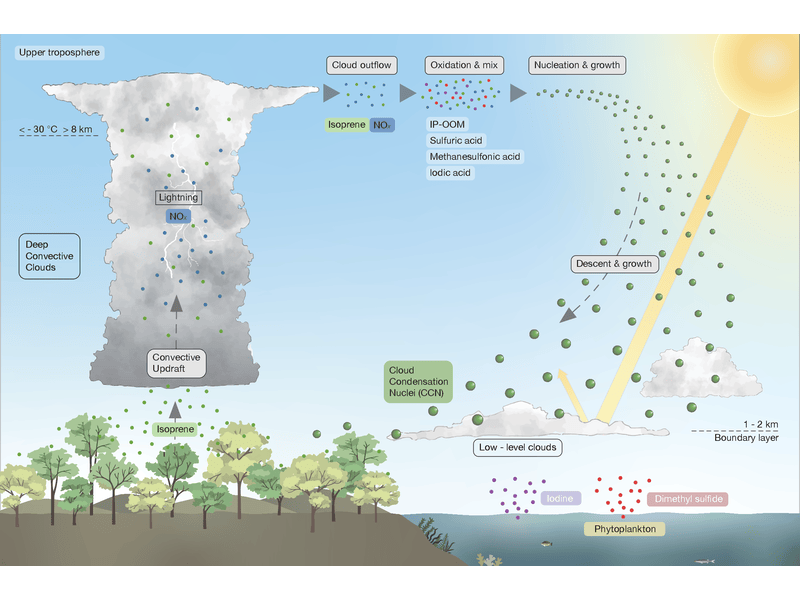
The Cyprus Institute: New research highlights the crucial role of isoprene, released by trees, in the fight against global warming
New ground-breaking research, led by the CLOUD team at CERN, which includes researchers from the Climate and Atmosphere Research Center (CARE-C) of The Cyprus Institute, has discovered that isoprene, a compound released by trees, is found in surprisingly high levels in the tropical upper troposphere. Notably, researchers have found that isoprene significantly contributes to new particle formation, which in turn leads to cloud formation, and can act as mitigator against climate change. The research findings, published in the prestigious journal Nature, suggest that natural sources, like forests, might have contributed significantly to cloud formations in the past and could change how we understand climate sensitivity and future warming. This means that as we reduce air pollution, the natural environment might help offset some of the warming effects brought about by climate change, underlining the importance of the natural environment in addressing the climate crisis.
Over the past 20 years, aircraft observations have detected extensive new particle formation in the tropical upper troposphere above the Amazon, as well as over the Atlantic and Pacific Oceans. However, the origin of these particles has so far remained unknown. Recent satellite observations over this area, though, have revealed that the levels of isoprene in the tropical upper troposphere are significantly higher than previously thought.
Isoprene, which is released by trees, is the most abundant non-methane hydrocarbon emitted into the atmosphere (0.5 billion tonnes per year) but is currently believed to be unable to form new particles. In the new experiments conducted by the CLOUD team, new particle formation from the oxidation of isoprene at upper tropospheric temperatures of −30 °C and −50 °C was explored. The results revealed that isoprene is triggering extensive new particle formation over vast regions of the tropical upper troposphere. When the particles descent to lower altitudes, they provide an important source of cloud formation world-wide, which strongly influences the Earth’s radiative balance.
Therefore, isoprene released by forests, through their contribution to producing cloud condensation nuclei in the pre-industrial atmosphere, might have contributed significantly to cloud formation in the past, which could reduce estimates of Earth’s climate sensitivity and, in turn, projections of warming later this century. It also implies that as air pollution is reduced through emission control measures, the natural environment might be able to act as a buffer and help offset some of the warming effects later this century.
Associate Professor Theodoros Christoudias of The Cyprus Institute, noted: “This discovery reshapes our understanding of natural climate processes. By revealing that isoprene released from forests is capable of forming cloud-seeding particles, we see a pathway through which nature itself has historically influenced the Earth’s climate. At a time when reducing emissions is critical in tackling the climate crisis, understanding the profound role of forests and the natural environment helps us refine model predictions, by illuminating a natural mechanism that wasn’t fully understood until now.”
The CLOUD Experiment at CERN allows for measuring aerosol nucleation and growth under cosmic rays. Atmospheric aerosols and their effect on clouds are recognised by the IPCC as the main uncertainty in climate models. The Cyprus Institute participates in the CLOUD experiment via its Climate and Atmosphere Research Center (CARE-C) by performing atmospheric, climate, and air quality modelling with global and regional models, and comparing CLOUD data with those obtained in field campaigns over land, e.g. the tropics, marine and urban regions.
Original publication: Shen, J., Russell, D.M., DeVivo, J. et al. New particle formation from isoprene under upper-tropospheric conditions. Nature 636, 115–123 (2024). https://doi.org/10.1038/s41586-024-08196-0
For queries contact: Dr Theodoros Christoudias, Associate Professor at the Climate and Atmosphere Research Center (CARE-C) of The Cyprus Institute: christoudias@cyi.ac.cy



